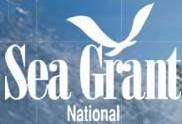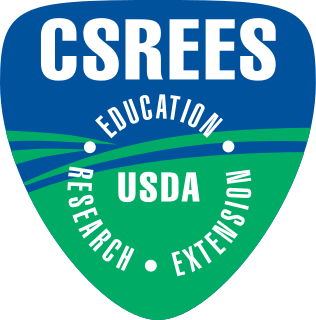
The Pacific Community (SPC) is the principal scientific and technical organisation in the Pacific region. It is an international development organisation owned and governed by its 26 country and territory members. With more than 600 staff, the organisation's headquarters are in Nouméa, New Caledonia, and it has regional offices in Suva, Fiji, and Pohnpei, Federated States of Micronesia, as well as a country office in Honiara, Solomon Islands, and field staff in other Pacific locations. Its working languages are English and French.

The National Sea Grant College Program is a program of the National Oceanic and Atmospheric Administration (NOAA) within the U.S. Department of Commerce. It is a national network of 33 Sea Grant Colleges and universities involved in scientific research, education, training, and extension projects geared toward the conservation and practical use of the coasts, Great Lakes, and other marine areas. The program is administered by the National Oceanic and Atmospheric Administration (NOAA) and is based in Silver Spring, Maryland. No sea rights have actually been granted, only money.

A land-grant university is an institution of higher education in the United States designated by a state to receive the benefits of the Morrill Acts of 1862 and 1890.

The University of Hawaiʻi at Mānoa is a public co-educational research university as well as the flagship campus of the University of Hawaiʻi system. The school is located in Mānoa, an affluent neighborhood of Honolulu, Honolulu County, Hawaiʻi, United States, approximately three miles east and inland from downtown Honolulu and one mile (1.6 km) from Ala Moana and Waikīkī. The campus occupies the eastern half of the mouth of Mānoa Valley. The John A. Burns School of Medicine, part of the University of Hawaiʻi at Mānoa, is located in Kakaʻako, adjacent to the Kakaʻako Waterfront Park. It is accredited by the Western Association of Schools and Colleges from the western mainland U.S. and is governed by the Hawaii State Legislature and a semi-autonomous board of regents, which in turn, hires a president to be administrator. This university campus also houses the main offices of the entire University of Hawaiʻi system.

The National Tropical Botanical Garden (NTBG) is a Hawaii-based not-for-profit institution dedicated to tropical plant research, conservation, and education. It operates a network of botanical gardens and preserves in Hawaii and Florida.
School of Architecture and Planning (SAP) is one of the four constituent colleges of Anna University, Chennai, Tamil Nadu. It was established as a Department of Architecture of the University of Madras in 1957 and was located in the Alagappa College of Technology. The department was later renamed as the School of Architecture and Planning, and shifted to its own independent campus in 1968. It is now a constituent college of Anna University.

The College of the Marshall Islands (CMI) is a regionally accredited autonomous community college offering associate degree programs in liberal arts and sciences, business and information technology, elementary education, and nursing. It also offers high school equivalency, community extension, student development, and certificate programs. The College primarily serves students from within the Micronesian region and is designated as the national post-secondary institution for the Republic of the Marshall Islands (RMI), as enacted in RMI PL 1992-13, The College of the Marshall Islands Act.

The Institute of Food and Agricultural Sciences (IFAS) is an agriculture, life science, pathogen, and invasive species research facility in Florida affiliated with University of Florida. It is a partnership between federal, state, and county governments that includes an extension office in each of Florida's 67 counties, 13 research and education centers, several demonstration sites, the University of Florida College of Agricultural and Life Sciences, the Center for Tropical Agriculture, portions of the University of Florida College of Veterinary Medicine, the Florida Sea Grant program, and the International Program for Food, Agriculture and Natural Resources.

Sida fallax, known as yellow 'ilima, or in Hawaiian, ʻilima, is a species of herbaceous flowering plant in the Hibiscus family, Malvaceae, that occurs on some Pacific Islands. The flowers are small, 0.75–1 in (1.9–2.5 cm) in diameter, have five petals, and are a golden yellow in color. Plants may be erect or prostrate and are found in drier areas in sandy soils, often near the ocean. ʻIlima is the symbol of Laloimehani and is the flower for the island of Oʻahu.

The Alabama Cooperative Extension System provides educational outreach to the citizens of Alabama on behalf of the state's two land grant universities: Alabama A&M University and Auburn University.

Open education is education without academic admission requirements and is typically offered online. Open education broadens access to the learning and training traditionally offered through formal education systems. The qualifier "open" refers to the elimination of barriers that can preclude both opportunities and recognition for participation in institution-based learning. One aspect of openness or "opening up" education is the development and adoption of open educational resources.
The Arkansas Agricultural Experiment Station (AAES) is the statewide research component of the University of Arkansas System's Division of Agriculture. The Division also includes the Cooperative Extension Service. The AAES and CES work together to develop and test new agricultural technology and extend it to the public. Research faculty and staff are based on five university campuses, at five Research and Extension Centers; six research stations and seven specialized units.

The Asiatic rhinoceros beetle, coconut rhinoceros beetle or coconut palm rhinoceros beetle, is a species of rhinoceros beetle belonging to the Scarabaeidae family. O. rhinoceros attacks the developing fronds of Raffia, coconut, oil, and other palms in tropical Asia and a number of Pacific islands. Damaged fronds show typical triangular cuts. The beetle kills the palms when the growing point is destroyed during feeding. The larvae do not damage crops, but instead grow in dead, decaying trunks and other organic matter.
The University of Kentucky College of Agriculture is a public agricultural college at the University of Kentucky. The college was renamed the College of Agriculture, Food, and Environment on July 1, 2013. The name change incorporates the college's expanded role that occurred with the merger of the College of Human Environmental Sciences into the College of Agriculture and also demonstrates the college's response to key components of Kentucky's economic future. The college's research, teaching and outreach programs encompass farms, forests, food, fiber, families and communities.

University of Alaska Fairbanks Cooperative Extension Service is an outreach-based educational delivery system supported by a partnership between the United States Department of Agriculture (USDA) and the University of Alaska Fairbanks (UAF). The UAF Cooperative Extension Service annually serves approximately 80,000 Alaskans, “providing a link between Alaska's diverse people and communities by interpreting and extending relevant university, research-based knowledge in an understandable and usable form to the public.” Since 1930 the UAF Extension Service has partnered with many organizations across the state of Alaska in pursuit of fulfilling its land-grant university mission to disseminate agricultural research and other scientific information.

Makerere University Library is the main library of Makerere University in Kampala, Uganda. It is the oldest academic library in Uganda, established in 1949. In addition to its primary role as an academic library, it also serves as the national reference library and the legal depository of all works published in Uganda. It has been a depository for the United Nations since 1956.
The Washington State University College of Agricultural, Human, and Natural Resource Sciences (CAHNRS) is one of the ten colleges of Washington State University that offers undergraduate and graduate programs. Established as Washington Agricultural College and School of Science, the college started instructions on January 13, 1892. The college is in Pullman, Washington, and became a land-grant college after the passage of Morrill Act. The college provides education, research, and services through fifteen academic departments, four research and extension centers, and thirty-nine county extension offices across the state of Washington. The college is known for apple production, grape growers and small grain genetics and breeding.

The Cooperative State Research, Education, and Extension Service (CSREES) is an extension agency within the U.S. Department of Agriculture (USDA), part of the executive branch of the federal government. The 1994 Department Reorganization Act, passed by Congress, created CSREES by combining the former Cooperative State Research Service and the Extension Service into a single agency.














